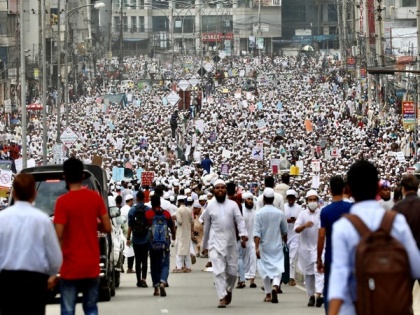Pak appeasement policy towards TLP to cost long-term peace, stability
By ANI | Published: November 7, 2021 01:07 AM2021-11-07T01:07:44+5:302021-11-07T01:15:03+5:30
Imran Khan-led Pakistan Tehreek-e-Insaf (PTI's) government's appeasement policy towards the religious outfit Tehreek-e-Labaik Pakistan's (TLP) will cost the long-term peace and stability of Islamabad.

Pak appeasement policy towards TLP to cost long-term peace, stability
Imran Khan-led Pakistan Tehreek-e-Insaf (PTI's) government's appeasement policy towards the religious outfit Tehreek-e-Labaik Pakistan's (TLP) will cost the long-term peace and stability of Islamabad.
Abdul Basit Khan, a research fellow at the S Rajaratnam School of International Studies, Singapore, writing in Arab News said that TLP is the long-term price the state is paying for its short-term myopic policies. Following what has transpired in TLP's long marches and style of politics, the state is at crossroads.
Since the 2017 Faizabad sit-in, TLP long marches toward Islamabad, except for 2019, have become an annual spectacle. Each year, TLP besieges Islamabad and returns after securing concessions from the government of the day by holding a gun to its head. In doing so, it gains more strength, political space and ideological prowess.
After blowing hot and cold for two weeks, the ruling Pakistan Tehreek-e-Insaf (PTI) government's capitulation to TLP's demands captures the pitfalls of using radical-religious groups for short-term political gains which incur long-term catastrophic consequences.
The PTI government's helplessness and knee-jerk responses in the face of TLP's long march also underscore the state's lack of imagination and viable strategies to deal with faith-based extremism, which is now creeping into mainstream political space, reported Arab News.
The TLP-PTI standoff is not fully resolved yet as the former is staying put in Wazirabad until the release of its chief Saad Hussain Rizvi and the removal of the ban.
Saad's release and TLP's success in forcing the PTI government to remove the ban would turbocharge its incendiary narrative ahead of the next general elections.
It will further increase TLP's grassroots appeal among the lower-middle and working-class, reeling from soaring inflation, unemployment, and poverty, said Abdul Basit Khan.
Despite sporadic incidents of lone-actor terrorism by its members, TLP does not profess systematic violence to achieve its stated political ends. Instead, it uses disruptive politics, vandalism, protest rallies, long-marches and sit-ins as the preferred modus operandi. However, at the same time, TLP has not discouraged lone actor killings by its operatives.
Hence, TLP can be located at the intersection of violent and non-violent extremism if it is classified from typological frameworks of terrorism studies, i.e., isolated incidents of terrorism are there, but the group on balance is extremist but not terrorist, reported Arab News.
TLP's hybridized nature and grassroots permeation makes it a hard nut to crack politically, ideologically and legally, said Abdul Basit Khan
TLP, like all other religious groups in Pakistan, has both formal and informal mobilization structures to advance its ideological and political interests. Formally, it is registered with the Election Commission of Pakistan as a political party and contests elections to gain political legitimacy and mainstream its agenda.
Informally, it operates as a movement, i.e., Tehreek-e-Labaik Ya Rasoolullah, to exert street pressure on the political system to compensate for its weak electoral clout.
Had on-off bans, arbitrary arrests and censoring it from the mainstream media worked, TLP would have been confined to the dustbin of history, said Abdul Basit Khan.
Since its emergence on Pakistan's religio-political landscape, TLP has taken blasphemy activism to a whole new level. For instance, in 2020, as many as 200 incidents of blasphemy accusations were recorded in Pakistan. This year, this figure soared to 234 cases of blasphemy allegations by mid-October.
These troubling statistics reveal the traction of TLP's ideological narrative and its fallout, i.e., growing religious intolerance, shrinking space for free speech, and the state's inability to rationalize religious discourse in Pakistan.
In this hostile environment, no one can even dare think of reforming the procedural lacunae in the blasphemy laws, which often have been misused.
Pakistan will have to decide what kind of polity it wants-- the one which bends over backwards to appease such groups to keep its writ at the cost of long-term peace and stability, or vice versa, said Abdul Basit Khan.
( With inputs from ANI )
Disclaimer: This post has been auto-published from an agency feed without any modifications to the text and has not been reviewed by an editor
Open in app